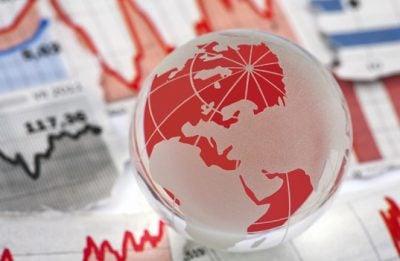Total System Failure Will Give Rise to New Economy?

Nobody, anywhere, could have predicted what we are now witnessing: in a matter of only a few weeks the accumulated collapse of global supply chains, aggregate demand, consumption, investment, exports, mobility.
Nobody is betting on an L-shaped recovery anymore – not to mention a V-shaped one. Any projection of global gross domestic product (GDP) in 2020 gets into falling-off-a-cliff territory.
In industrialized economies, where roughly 70% of the workforce is in services, countless businesses in myriad industries will fail in a rolling financial collapse that will eclipse the Great Depression.
That spans the whole spectrum of possibly 47 million US workers soon to be laid off – with the unemployment rate skyrocketing to 32% – all the way to Oxfam’s warning that by the time the pandemic is over half of the world’s population of 7.8 billion people could be living in poverty.
According to the World Trade Organization’s (WTO) most optimistic 2020 scenario – certainly to become outdated before the end of Spring – global trade would shrink by 13%. A more realistic and gloomier WTO scenario sees global trade plunging by 32%.
What we are witnessing is not only a massive globalization short circuit: it’s a cerebral shock extended to three billion hyperconnected, simultaneously confined people. Their bodies may be blocked, but they are electromagnetic beings and their brains keep working – with possible, unforeseen political and other consequences.
Soon we will be facing three major, interlocking debates: the management (in many cases appalling) of the crisis; the search for future models; and the reconfiguration of the world-system.
This is just a first approach in what should be seen as a do-or-die cognitive competition.
Particle accelerator
Sound analyses of what could be the next economic model are already popping up. As background, a really serious debunking of all (dying) neoliberalism development myths can be seen here.
Yes, a new economic model should be revolving around these axes: AI computing; automated manufacturing; solar and wind energy; high-speed 5G-driven data transfer; and nanotechnology.
China, Japan, South Korea and Taiwan are very well positioned for what’s ahead, as well as selected European latitudes.
Plamen Tonchev, head of the Asia unit at the Institute of International Economic Relations in Athens, Greece, points to the possible reorganization – short term – of Belt and Road Initiative projects, privileging investment in energy, export of solar panels, 5G networks and the Health Silk Road.
Covid-19 is like a particle accelerator, consolidating tendencies that were already developing. China had already demonstrated for the whole planet to see that economic development under a control system has nothing to do with Western liberal democracy.
On the pandemic, China demonstrated – also for the whole planet to see – that containment of Covid-19 can be accomplished by imposing controls the West derided as “draconian” and “authoritarian,” coupled with a strategic scientific approach characerized by a profusion of test kits, protection equipment, ventilators and experimental treatments.
This is already translating into incalculable soft power which will be exercised along the Health Silk Road. Trends seem to point to China as strategically reinforced all along the spectrum, especially in the Global South. China is playing go, weiqi. Stones will be taken from the geopolitical board.
System failure welcomed?
In contrast, Western banking and finance scenarios could not be gloomier. As a Britain-centric analysis argues, “It is not just Europe. Banks may not be strong enough to fulfill their new role as saviors in any part of the world, including the US, China and Japan. None of the major lending systems were ever stress-tested for an economic deep freeze lasting months.”
So “the global financial system will crack under the strain,” with a by now quite possible “pandemic shutdown lasting more than three months” capable of causing “economic and financial ‘system failure.’”
As system failures go, nothing remotely approaches the possibility of a quadrillion dollar derivative implosion, a real nuclear issue.
Capital One is number 11 on the list of the largest banks in the US by assets. They are already in deep trouble on their derivative exposures. New York sources say Capital One made a terrible trade, betting via derivatives that oil would not plunge to where it is now at 17-year lows.
Mega-pressure is on all those Wall Street outfits that gave oil companies the equivalent of puts on all their oil production at prices above $50 a barrel. These puts have now come due – and the strain on the Wall Street houses and US banks will become unbearable.
The anticipated Friday oil deal won’t alter anything: oil will stay around $20 per barrel, $25 max.
This is just the beginning and is bound to get much worse. Imagine most of US industry being shut down. Corporations – like Boeing, for instance – are going to go bankrupt. Bank loans to those corporations will be wiped out. As those loans are wiped out, the banks are going to get into major trouble.
Derivative to the max
Wall Street, totally linked to the derivative markets, will feel the pressure of the collapsing American economy. The Fed bailout of Wall Street will start coming apart. Talk about a nuclear chain reaction.
In a nutshell: The Fed has lost control of the money supply in the US. Banks can now create unlimited credit from their base and that sets up the US for potential hyperinflation if the money supply grows non-stop and production collapses, as it is collapsing right now because the economy is in shutdown mode.
If derivatives start to implode, the only solution for all major banks in the world will be immediate nationalization, much to the ire of the Goddess of the Market. Deutsche Bank, also in major trouble, has a 7 trillion euro derivatives exposure, twice the annual GDP of Germany.
No wonder New York business circles are absolutely terrified. They insist that if the US does not immediately go back to work, and if these possibly quadrillions of dollars of derivatives start to rapidly implode, the economic crises that will unfold will create a collapse of the magnitude of which has not been witnessed in history, with incalculable consequences.
*
Note to readers: please click the share buttons above or below. Forward this article to your email lists. Crosspost on your blog site, internet forums. etc.
This article was originally published on Asia Times.
Pepe Escobar is a frequent contributor to Global Research.


